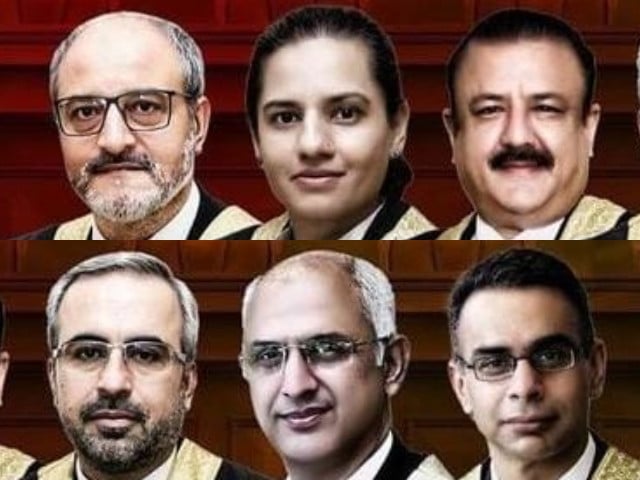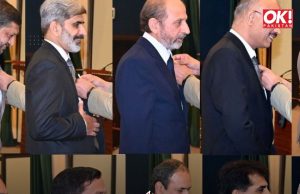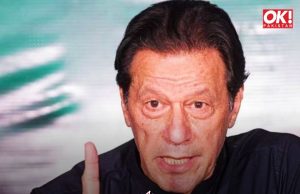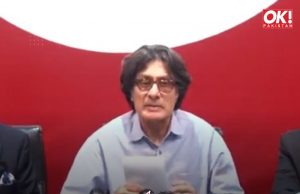ISLAMABAD: Six judges of the Islamabad High Court (IHC) have contacted the Supreme Judicial Council (SJC) in an unusual attempt to get clarification over the claimed interference of executive members, including intelligence agents, in legal proceedings.

In a letter to the SJC, which is chaired by Chief Justice Qazi Faez Isa, six judges of the IHC—Justice Mohsin Akhtar Kiyani, Justice Tariq Mehmood Jahangiri, Justice Babar Sattar, Justice Sardar Ejaz Ishaq Khan, Justice Arbab Muhammad Tahir, and Justice Saman Rafat Imtiaz—voiced concerns regarding the “interference” of intelligence agencies in judicial matters.
Therefore, we ask that a judicial convention be held to address the issue of intelligence agents interfering with court proceedings and/or intimidating judges in a way that compromises the judiciary’s independence.
The open letter, copies of which have been circulated to all SC justices, points out that further information about whether judges of other high courts have had comparable experiences may be obtained through such a convention.
“Such institutional consultation might then help the Supreme Court think through the best ways to safeguard the judiciary’s independence, establish a system to hold those who compromise it accountable, and make clear to judges what steps they should take individually when they become the target of executive branch meddling or intimidation.”
The action was taken only a few days after the Supreme Court declared that former IHC Justice Shaukat Aziz Siddiqui’s removal was unlawful and that he now has the status of a retired judge.
The decision brought to light the SJC’s handling of Justice Siddiqui’s case, showing that the council had moved on with the belief that the truthfulness of the accusations made by the former judge held no weight.
Moreover, it highlighted the alleged inability of Justice Siddiqui to independently verify or validate the claims.
The IHC judges emphasised in their letter to the SJC that the council’s recommended code of conduct for judges does not include explicit instructions on how judges should react to situations that compromise their independence as judges.
The council is composed of Chief Justice Muhammad Ibrahim Khan of the Peshawar High Court, Justice Syed Mansoor Ali Shah, Justice Munib Akhtar, and Chief Justice Aamer Farooq of the IHC.
Isa CJP “in the dock”
Following the letter, everyone is watching SJC, under the direction of CJP Qazi Faez Isa, to see what would happen next.
The former president of the Sindh High Court Bar Association, Salahuddin Ahmed, emphasises how important it is that the Supreme Court move swiftly on its own initiative.
In Shaukat Siddiqui’s case, I had requested that the SC look into his claims against intelligence agencies (either directly or through a Commission) on behalf of the Islamabad Bar. That is now extremely necessary,” he stated.
A three-judge committee made up of CJP Qazi Faez Isa, Justice Syed Mansoor Ali Shah, and Justice Munib Akhtar will discuss the non-exercise of suo motu jurisdiction in this case after the Supreme Court Practice and Procedure Act 2023 is approved.
Prominent attorneys are also wondering why IHC CJ Aamer Farooq did not respond forcefully to the letters written by his colleagues about the meddling of intelligence services in court proceedings.
It was said by former senator Mustafa Nawaz Khokhar that CJP Isa was put in the dock by the judges of the IHC.
“It seems that their chief justice let them down. Citing Justice Siddique as an example, they urge an institutional reaction to intimidation and tampering with evidence that could be used against them. This necessitates the legal community defending the judiciary’s independence, according to Khokhar.
The justices stressed in their letter how important it is to look into whether the executive branch has a policy in place that interferes with judicial matters.
In addition, the letter demanded that a judicial convention be held to discuss the problem of intelligence agents interfering with court proceedings and intimidating judges, therefore weakening the independence of the judiciary.
The justices said, “Such institutional consultation might then assist the Supreme Court to consider how best to protect independence of the judiciary, put in place a mechanism to affix liability for those who undermine such independence and clarify for the benefit of individual judges the course of action they must take when they find themselves at the receiving end of interference and/or intimidation by members of the executive.”
The letter stated that Justice Siddiqui had been dismissed because he had made public allegations that members of the Inter-Services Intelligence (“ISI”), under the direction of Major General Faiz Hameed (DG-C of ISI), were deciding who would sit on which benches at the IHC and interfering with the Accountability Court of Islamabad’s proceedings.
“Judge Siddiqui has reaffirmed in media appearances his demand that claims of meddling by ISI agents with the intention of manipulating the result of legal processes be looked into following the SC’s ruling.”
“We support Justice Siddiqui’s request to look into the allegations he made, and we ask that the investigation’s purview be extended to find out if there is still interference with the administrative functions of IHC (such as bench composition and case marking) and the judicial proceedings of the courts under IHC’s supervision, as well as whether judges of High Courts, District Courts, and Special Courts are carrying out their duties in response to overt or covert threats of coercion from intelligence agencies.”
“We also note that the SJC-mandated Code of Conduct for Judges does not offer any guidance on how judges should respond to and/or report instances that impede judicial independence and amount to intimidation,” the judges declared.
“We believe it is imperative to inquire into and determine whether there exists a continuing policy on part of the executive branch of the state, implemented by intelligence operatives who report to the executive branch, to intimidate judges, under threat of coercion or blackmail, to engineer judicial outcomes in politically consequential matters,” the judges stated.




















































